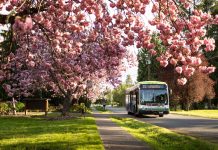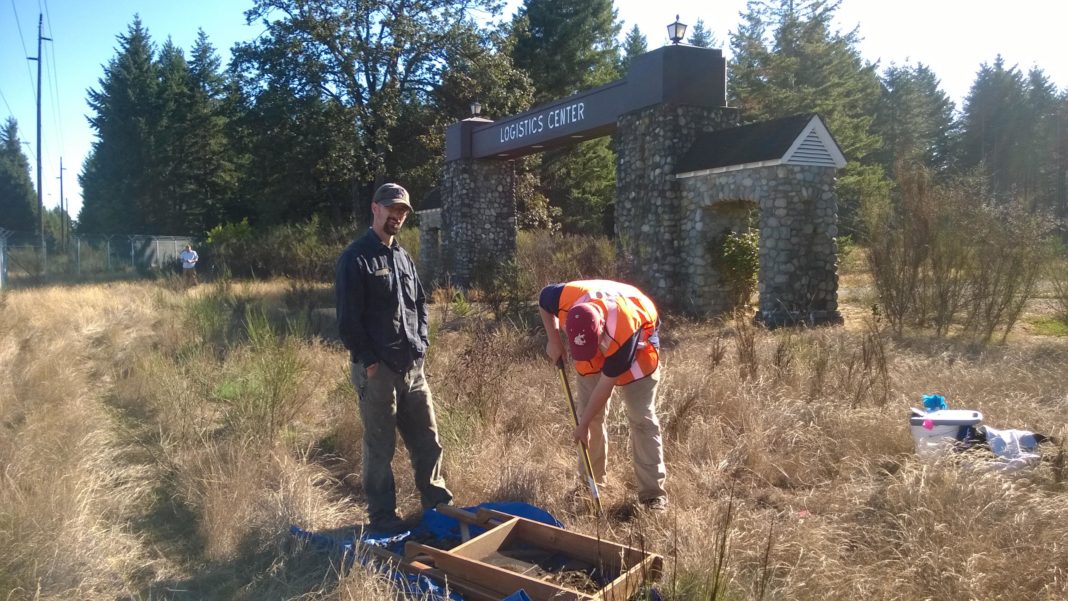Sarah Amell, owner of ATCRC moved to Olympia when she was nine, so she considers the Pacific Northwest home turf. Early on she planned to study marine ecology, but when she attended South Puget Sound Community College she was introduced to Northwest coast archaeology and hooked.
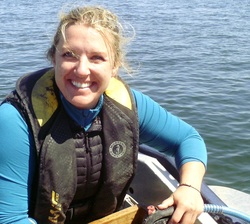
Sarah’s first hands-on experience as an undergrad was with a wet-site field school on Mud Bay where she studied for the summer. The next year, she was hired back as the Lab Director and Archaeological Site Manager. She continued education focusing on Pacific Northwest Native Studies and Northwest Coast Archaeology, working in cultural resources for a local tribe and earning her Bachelor’s Degree locally from The Evergreen State College. As an advanced underwater diver, she reconnected with her love of the sea by going on to receive her Masters in Maritime Archaeology from Flinders University in Adelaide Australia, where she lived abroad completing maritime archaeology studies and fieldwork throughout Queensland and Tasmania.
Though she always planned on opening her own firm, Sarah assumed that wouldn’t be until she was closer to retirement, but after working for a private consulting firm and then the Washington State Department of Transportation for a few years, she decided to take the leap following the birth of her first child. Sarah says, “It was a good time to try my hand at consulting.”
In 2011, Sarah opened Aqua Terra Cultural Resource Consultants. At first it was just a one-woman shop. She did all of the survey work and assessments on her own for the first year, utilizing a home office workspace. In her second year, she was awarded a year-long cultural resource project for Sound Transit Authority, which she says was a “game-changer.” It allowed her to increase her staff to a total of five, with everyone telecommuting from their own home offices, while meeting on site for field work.
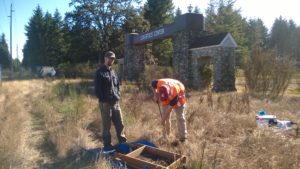
Aqua Terra handles cultural resource projects for local, state and federal agencies, tribes, architecture and engineering firms and private property owners throughout Washington State. Locally, Sarah’s team completed the cultural resources assessment for the Old Brewery property in Tumwater. They also spent the last three years working on the Washington State Department of Transportation’s I-5 JBLM widening project, throughout Joint Base Lewis-McChord.
Sarah says, “Within the I-5 corridor we have completed cultural resources assessment for approximately 8 miles of culturally rich landscape throughout JBLM. This piggy-backed on cultural resource assessment I oversaw for the WSDOT I-5 SR 16 Tacoma Pierce County HOV Program Projects which covered about 79 miles of HOV lanes throughout Pierce County, so in total, I have been involved with cultural resource assessment of approximately 90 miles of highway corridor and connections throughout greater Pierce County.”
While most of Aqua Terra’s work is land-based, they’re also passionate about completing underwater cultural resource assessments. While doing in-water survey in the Columbia River, her team successfully identified a submerged archaeological site, recovering archaeological materials, including an intact biface, or more specifically a “classic plateau pentagonal knife.”
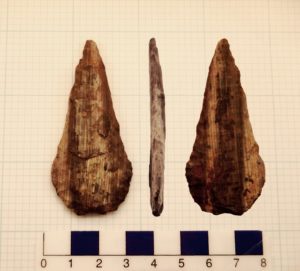
“It was so exciting for our team to identify a site using in-water vibracore bore samples,” Sarah says. “This type of biface knife was used with big game hunt processing and is common to the Columbia River basin. They date from early in the late period of prehistory, are considered a hallmark of the Cayuse Phase, which was 500-1500 years ago.”
Most of the projects Aqua Terra takes on are to identify the presence of archaeological or historic sites that could be impacted by proposed construction projects. When looking at a site like the old Tumwater Brewery, for example, they start by determining where the direct impact areas for ground disturbance may be. Then, they conduct historical background research and look at other recorded sites and structures in the area, to see if there are any in the vicinity of the project. They work closely with the affiliated local tribes, seeking technical information regarding the project area. From there, they do hand shovel testing to identify any artifacts. Typically, they find things like historic nails, cans and bottles, but they’re also looking for stone tools, charcoal fragments and fire-modified rock. After fieldwork they provide a professional assessment and recommendation for the client and the agencies to review.
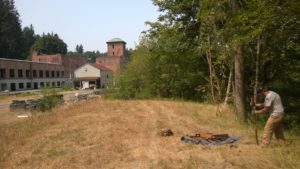
With the increased staff and capacity to take on projects like these, Sarah knew it was time to make some decisions about where the business was headed. She participated in Thurston Economic Development Council’s Scale-Up program, which she says is “geared toward small business owners who have been in business for two or more years. The program is tremendously helpful in assisting owners in identifying areas in their business model that may need further development and focus, and developing a growth plan. It was a great opportunity to work side by side with other Thurston County small business owners.”
Participating in the program allowed her to hone in on the need to manifest a multi-purpose layout office and lab space that was suitable for use by multiple employees. She says, “I still want to provide telecommuting opportunities and flexible work schedules to my staff. It keeps people happy and helps us to put our families first. The staff we retain are motivated and self-directed. But this storefront provides a suitable place for our clients to meet with us in person, as well as staff access to our archival library, specialized equipment, individual workstations and our wet/dry archaeological processing lab. There is gained employee development benefit with our team working side by side.”
That vision became a reality this past November when Aqua Terra purchased a six-acre parcel with a large shop, outbuildings and unfinished office space in southwest Olympia. It had plenty of room for equipment, multiple workstations and construction of a wet/dry lab for an archaeological processing making it ideal. They began renovations for the office in December 2016, and in the new office was completed mid-May.
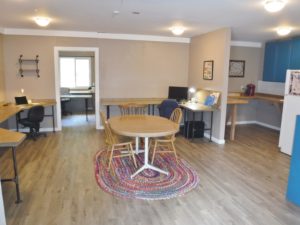
Sarah says it’s been fun to watch it develop from “concrete slab and plywood to adding all the personally designed and stained desk units, finishes and office equipment. I have been dreaming of this for years. I’ve had staff members lend a hand in everything including painting the ceiling. It’s nice to see everyone supportive and excited about where we’re headed.”
Sarah and the team at Aqua Terra are settled in to the new workspace and welcome hosting new and previous clients seeking support with their cultural resource projects. Sarah says, “We’re here, we’re in the South Sound providing cultural resource services and we are excited and available to assist you with your cultural resource compliance needs.”
To learn more about Aqua Terra Cultural Resource Consultants, click here.
Sponsored









